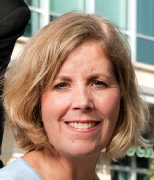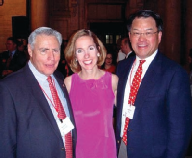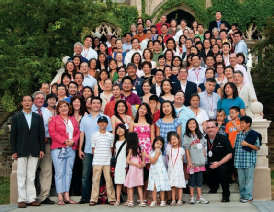Forging a Path for Alumni Volunteers
By Scott Pesner '87
Ask an alumnus what "Cornell tradition" means to them, and one of the more popular responses you'll receive is "giving back." Yes, alumni offer financial support, and you can always count on Cornellians to cheer on Big Red teams. But for many, the most meaningful method of giving back is by donating their time to their alma mater. From organizing reunions to serving on college advisory councils to meeting with prospective students as members of the Cornell Alumni Admissions Ambassador Network (CAAAN), more than 12,000 alumni volunteer each year.
"My experience as a volunteer began when I moved to Boston after graduating and became involved in the Cornell Club," says Kristen Rupert '74, one of the University's most active volunteers and a recipient of the 2010 Frank H.T. Rhodes Award for Exemplary Alumni Service. She eventually became president of the Cornell Alumni Federation (now the Cornell Alumni Association)—and her involvement didn't stop there. She kept participating in class activities and became president of her class, a member of the Plantations Advisory Board, and chair of the Cornell Outdoor Education Advisory Board. This in turn led her to join the advisory board for Cornell Athletics. "Over time, your interests change and you run your course in what you volunteer for," says Rupert. "I then started looking for things that suit my passion."

But unlike Rupert, many volunteers need help in navigating their Cornell volunteer lives. That's where Laura Denbow comes in.
A career services administrator who has worked at the University of Virginia, Georgetown, and Bucknell, Denbow joined Cornell's Alumni Affairs staff in July as senior director of volunteer programs. Denbow's missions include promoting alumni volunteer opportunities and creating ways to have a lifelong volunteer career with Cornell. To that end, she is working with the recently formed Board of Trustees Task Force on Volunteer Leadership, chaired by Diana Daniels '71. "Cornell has a wonderful history with volunteers, and we want to make sure it is a mutually beneficial experience," says Denbow. "How can we celebrate the great volunteer efforts of the past and continue to create opportunities that will be valued by Cornell as well as by alumni?"
Another question can be raised: is there a definitive end to a volunteer's career? Kelly Smith Brown '88, MBA '92, is one alumna who is still finding ways to continue her volunteer efforts despite reaching one of the highest levels of involvement, as a member of the Board of Trustees. Brown, who recently finished a four-year term as an alumni-elected trustee, sees her volunteerism as open-ended. She has always been involved in Cornell activities, building upon her undergraduate experience as head of the CALS ambassadors. Brown became involved in class activities as a reunion chair and was elected class president; she joined the board of the Cornell Association of Class Officers (CACO) and became its president as well. She also served on several advisory councils, including those of CALS, the Undergraduate Business Program, and the Johnson School.
A former marketing executive with Procter & Gamble, Brown will continue to advise Cornell on its branding efforts, feeling that the University still needs to differentiate itself among top-tier schools. She is also taking the skills she learned from being a trustee and applying them to other organizations, serving on the boards of the Cincinnati Ballet and the Cincinnati Zoo. "Do I know what I want to do next? No," Brown says. "Am I worried? No. When people try to proactively manage their volunteer path, it won't work. Let Cornell help you. The essence of being a Cornell volunteer is the willingness to roll up your sleeves and do the very best you can."
Anthony Chang '00 stepped down last year as president of the Cornell Asian Alumni Association (CAAA). Although he still advises the group, he's looking for other ways to be involved. Through CAAA, he discovered that he enjoys working with students, so he joined the Cornell Alumni Student Mentoring Program and became a CAAAN volunteer. "We often don't get asked what we can do for Cornell, but what Cornell can do for us," Chang says. "We often don't seek out how to get involved."
Creating a "volunteer funnel" is also on Denbow's agenda. She plans to launch a website where alumni can learn about volunteer opportunities and also find activities that match specific interests. "It's all about the opportunity for alumni to select what they want to become involved in," Denbow says, "and how we can identify and take advantage of those who want to do more."

Jeff Berg '79, ME '80, MBA '81, is another former alumni-elected trustee who sees his volunteer career continuing. "Just because my term ended doesn't mean I can't get involved in other activities," says Berg. Like Rupert, Berg started as a volunteer through the Cornell Club of Boston. He maintained his Cornell involvement when he moved abroad, then joined his class reunion campaigns, eventually being elected class president, while also serving on the advisory boards of the Johnson School and Cornell's Adult University. Now, with his term over, he is continuing his work by advising CACO and eCornell. "I want to apply my professional experience in management consulting to what I do for Cornell," he says.
Denbow holds that Cornell volunteer involvement often mirrors what's happening in the modern workplace. "When you think about careers today, growth is not always vertical," she says. "Sometimes it's horizontal and sometimes it's about taking a step back. So the question becomes, how can volunteers contribute to Cornell in this growth pattern?"
One person who can answer that question is Jeff Estabrook '80, JD '83. Estabrook started as a volunteer with the Cornell Club of Philadelphia. He was then asked to join the Cornell Alumni Federation board and eventually was elected president. He joined the University Council and became its chair. But even after heading two major alumni organizations, Estabrook's volunteer work continues. He has maintained his involvement at the club level and is chair of the Philadelphia Tower Club. With a daughter in high school, he joined CAAAN. He also participated in class activities, which allowed him to bond with his classmates, many of whom he didn't know at Cornell. "I don't know what I want to do when I grow up," he says, "but when the University asks, I'll be there."
Alumni Leaders to Gather in D.C.
Building on the success of last year's first-ever Cornell Alumni Leadership Conference, alumni leaders—class officers, club board members, CAAAN chairs, and others—are encouraged to participate in the second annual conference, which will again take place over the last weekend in January. It will be held January 27-30 at the Wardman Park Marriott in Washington, D.C.
Designed to bring together alumni leaders with varied interests from around the country and the world, the conference will give participants the chance to network with senior university leaders, learn from each other, and learn more about today's Cornell. Planned events include a Saturday breakfast panel featuring vice president of student and academic services Susan Murphy '73, PhD '94. President David Skorton will be the Saturday luncheon speaker.
For more information go to www.alumni.cornell.edu/calc.
PCCW Welcomes New Members
The President's Council of Cornell Women (PCCW)— designed to help foster community among highly accomplished alumnae and deepen their relationship to the University—elected its newest members last spring.
 The thirty-three new members represent a cross-section of alumnae who have succeeded professionally and/or as alumni leaders. They are: Daniella Ballou-Aares '96, Deborah Baly, MS '79, Cecile Belaman '91, Janet Bell '82, Shirine Boulos Anderson, BArch '78, MA '80, Petula Brown '92, Ayanna Clunis '95, Susan Corcoran '85, Natalie Costa '85, Cristina Greeven Cuomo '92, Tanya Curry-McMichael '88, Janine Simon Daughtry '88, Megan Clark Eisenberg '97, Nina Gershon '62, Virginia Jay Grandison, MBA '97, Wendy Schlessel Harpham '76, Honor Griffin Huntington '70, Hope Mehlman Hurowitz '87, Jessica Ingram-Bellamy '92, Wendy Jacobs '79, Sarah Jacoby '96, ME '97, Debra Ann James '75, JD '78, Meryl Kaynard '76, Deborah Landis '00, Daphne Mobley '83, Pamela Myers '78, Candace Osunsade '87, Christine Clark Pambianchi '90, Wendy Raymond '82, Kathryn Rudy '91, Renee Sokol Siegel '77, MBA '78, Seanna Antonia Thompson '97, and Juliana Whitmore '84.
The thirty-three new members represent a cross-section of alumnae who have succeeded professionally and/or as alumni leaders. They are: Daniella Ballou-Aares '96, Deborah Baly, MS '79, Cecile Belaman '91, Janet Bell '82, Shirine Boulos Anderson, BArch '78, MA '80, Petula Brown '92, Ayanna Clunis '95, Susan Corcoran '85, Natalie Costa '85, Cristina Greeven Cuomo '92, Tanya Curry-McMichael '88, Janine Simon Daughtry '88, Megan Clark Eisenberg '97, Nina Gershon '62, Virginia Jay Grandison, MBA '97, Wendy Schlessel Harpham '76, Honor Griffin Huntington '70, Hope Mehlman Hurowitz '87, Jessica Ingram-Bellamy '92, Wendy Jacobs '79, Sarah Jacoby '96, ME '97, Debra Ann James '75, JD '78, Meryl Kaynard '76, Deborah Landis '00, Daphne Mobley '83, Pamela Myers '78, Candace Osunsade '87, Christine Clark Pambianchi '90, Wendy Raymond '82, Kathryn Rudy '91, Renee Sokol Siegel '77, MBA '78, Seanna Antonia Thompson '97, and Juliana Whitmore '84.
Asian and Latino Alumni Groups Celebrate Their First Official Reunions
Among the more than 5,000 alumni who participated in Reunion 2010 in June were two special contingents that came together across many classes. This year, for the first time, the Cornell Asian Alumni Association (CAAA) and the Cornell Latino Alumni Association (CLAA) held their own official reunion gatherings.
For CAAA, the reunion was part of a celebration honoring the organization's twentieth anniversary. The event featured a wide array of meals, activities, and campus tours, as well as a special presentation by Emmy Award-winning journalist Farland Chang '84. In addition to focusing on the history of Asian students at Cornell, the reunion offered the chance for several generations of alumni to network and celebrate their experiences. "We walked away from Reunion totally re-energized," says Kent Sheng '78, BA '82, one of the co-chairs. "Everyone asked when we were going to do it again."

'We were able to talk with a wide variety of alumni about things that had shaped their Cornell experiences—what was different and what was similar.'Among CLAA members, the reaction was similar. "We discovered that there was a lot of mentoring going on," says CLAA president Natacha Carbajal '00. "We were able to talk with a wide variety of alumni about things that had shaped their Cornell experiences—what was different and what was similar." That discussion included a presentation by Professor Hector Velez, PhD '83, of the Latino studies program, who spoke about the history of Latinos at Cornell dating back to the early 1900s.
Both reunions had something else in common, according to Sheng and Carbajal. By the end of the long weekend, participants were inspired to give back to their communities and to Cornell.


